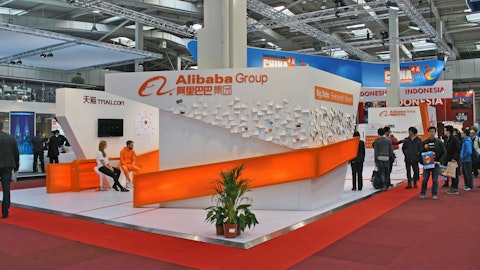Semper Vic Partners LP, an investment management firm, published its second-quarter 2021 investor letter – a copy of which can be downloaded here. A return of 11.0% was recorded by the fund for the second quarter of 2021, outperforming its Dow Jones Industrial and S&P 500 benchmark that delivered a 5.1% and 8.6% return respectively for the same period. You can take a look at the fund’s top 5 holdings to have an idea about their top bets for 2021.
In the Q2 2021 investor letter of Semper Vic Partners, the fund mentioned Alibaba Group Holding Limited (NYSE: BABA) and discussed its stance on the firm. Alibaba Group Holding Limited is an Hangzhou, China-based e-commerce company with a $447 billion market capitalization. BABA delivered a -31.13% return since the beginning of the year, while its 12-month returns are down by -42.34%. The stock closed at $165.41 per share on September 13, 2021.
Here is what Semper Vic Partners has to say about Alibaba Group Holding Limited in its Q2 2021 investor letter:
“It is hard to believe that it was over eight months ago that I wrote about our new investment which we had initiated late last year, Alibaba. As I mentioned at the time, I had long admired access Alibaba provides Western investors across a host of consumer products companies to Chinese commerce and economy.
Alibaba has long provided exposure to China’s foremost commerce hubs, especially through the form of Taobao and Tmall (especially its Luxury Pavilion collections). With roughly one billion Chinese average annual consumers and roughly 260 million additional consumers outside of China, it is hard to imagine shopping in China without involvement in one manner or another with Alibaba.
Alibaba’s focus on serving the needs of both merchants and consumers alike has allowed it to deliver its e-commerce at amongst the lowest take rate of any leading retailers. Alibaba also provides investors access to China’s leading cloud business. Alibaba, in efforts to be transparent, has reported its cloud segment separately since 2017.
By reporting cloud results separately, Alibaba allows investors to measure the substantial extent to which Alibaba has exercised both the “capacity to reinvest” as well as Alibaba’s management’s “capacity to suffer.” Alibaba’s management team enjoys the “capacity to suffer” as the result of protection from Wall Street’s disruptive censures as a result of protection provided them by Alibaba’s founding shareholder, Jack Ma.
During decades of Alibaba’s greatest growth, Mr. Ma evidenced a preference for taking on projects which, more often than not, eroded reported profits as investments he selected for greatest long-term growth in intrinsic value on a per share basis burdened reported profits in the near term.
In addition to attractive businesses which possessed the ability to reinvest internally, Alibaba was well capitalized. In late 2020, as we sized up our potential investment interest in Alibaba, we realized that Alibaba had a rock-solid balance sheet and financials in general. Not only did Alibaba have nearly $71 billion in cash and short-term securities within the company, but they also had investments in a portfolio of over 100 independent, digitally disruptive start-up companies. While most start-up investments are in Chinese companies, there are portfolio companies that also include non-Chinese start-up businesses. Finally, Alibaba currently has over a 30 percent interest in Ant Financial, which at the time of our initial investment research had
been recently valued at over $300 billion of estimated value…” (Click here to see the full text)

Christopher Penler / Shutterstock.com
Based on our calculations, Alibaba Group Holding Limited (NYSE: BABA) ranks 8th in our list of the 30 Most Popular Stocks Among Hedge Funds. BABA was in 146 hedge fund portfolios at the end of the first half of 2021, compared to 135 funds in the previous quarter. Alibaba Group Holding Limited (NYSE: BABA) delivered a -23.53% return in the past 3 months.
Hedge funds’ reputation as shrewd investors has been tarnished in the last decade as their hedged returns couldn’t keep up with the unhedged returns of the market indices. Our research has shown that hedge funds’ small-cap stock picks managed to beat the market by double digits annually between 1999 and 2016, but the margin of outperformance has been declining in recent years. Nevertheless, we were still able to identify in advance a select group of hedge fund holdings that outperformed the S&P 500 ETFs by 115 percentage points since March 2017 (see the details here). We were also able to identify in advance a select group of hedge fund holdings that underperformed the market by 10 percentage points annually between 2006 and 2017. Interestingly the margin of underperformance of these stocks has been increasing in recent years. Investors who are long the market and short these stocks would have returned more than 27% annually between 2015 and 2017. We have been tracking and sharing the list of these stocks since February 2017 in our quarterly newsletter.
At Insider Monkey, we scour multiple sources to uncover the next great investment idea. For example, Federal Reserve has been creating trillions of dollars electronically to keep the interest rates near zero. We believe this will lead to inflation and boost real estate prices. So, we recommended this real estate stock to our monthly premium newsletter subscribers. We go through lists like the 10 best EV stocks to pick the next Tesla that will deliver a 10x return. Even though we recommend positions in only a tiny fraction of the companies we analyze, we check out as many stocks as we can. We read hedge fund investor letters and listen to stock pitches at hedge fund conferences. You can subscribe to our free daily newsletter on our homepage.
Disclosure: None. This article is originally published at Insider Monkey.





